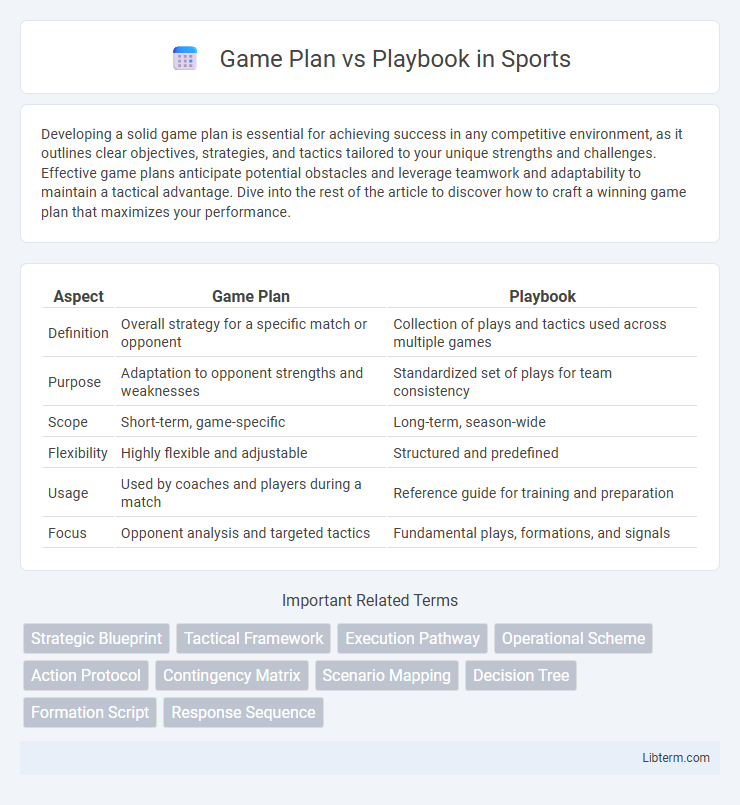Developing a solid game plan is essential for achieving success in any competitive environment, as it outlines clear objectives, strategies, and tactics tailored to your unique strengths and challenges. Effective game plans anticipate potential obstacles and leverage teamwork and adaptability to maintain a tactical advantage. Dive into the rest of the article to discover how to craft a winning game plan that maximizes your performance.
Table of Comparison
| Aspect | Game Plan | Playbook |
|---|---|---|
| Definition | Overall strategy for a specific match or opponent | Collection of plays and tactics used across multiple games |
| Purpose | Adaptation to opponent strengths and weaknesses | Standardized set of plays for team consistency |
| Scope | Short-term, game-specific | Long-term, season-wide |
| Flexibility | Highly flexible and adjustable | Structured and predefined |
| Usage | Used by coaches and players during a match | Reference guide for training and preparation |
| Focus | Opponent analysis and targeted tactics | Fundamental plays, formations, and signals |
Understanding the Game Plan: Definition and Purpose
A game plan refers to a strategic outline designed to achieve specific goals within a competitive environment, focusing on overall objectives and long-term success. It defines the purpose-driven approach and key tactics tailored to anticipated scenarios, guiding decision-making processes. Understanding a game plan involves recognizing its role in setting priorities, aligning resources, and providing a clear direction to outperform competitors effectively.
What is a Playbook: Key Concepts Explained
A playbook is a detailed collection of strategies, tactics, and procedures designed to guide decision-making and execution in specific scenarios, often used in business, sports, and technology contexts. It outlines predefined actions and responses to various challenges, enabling consistent performance and quick adaptation. Playbooks serve as a practical toolkit that translates high-level goals into actionable steps, ensuring alignment across teams and stakeholders.
Game Plan vs Playbook: Core Differences
A game plan outlines a broad strategy and overall objectives for achieving success, while a playbook details specific tactics and step-by-step actions to implement that strategy. The game plan focuses on long-term goals and resource allocation, whereas the playbook emphasizes execution, coordination, and adaptability in real-time situations. Understanding these core differences clarifies how strategic vision transitions into practical operations within competitive or organizational contexts.
Strategic Development: Crafting Your Game Plan
A game plan represents the overarching strategic framework guiding an organization's long-term objectives, while a playbook contains detailed tactics and actions to execute each phase of the plan. Effective strategic development centers on crafting a game plan that aligns vision, resources, and competitive analysis, ensuring adaptability and clarity. This foundational strategy enables organizations to develop precise playbooks that respond to evolving market conditions and operational challenges.
Building an Effective Playbook: Essential Elements
Building an effective playbook requires clear objectives, detailed strategies, and adaptable tactics tailored to specific scenarios within the game plan. Incorporating real-time data analysis and feedback loops enhances decision-making and ensures continuous improvement. Essential elements include predefined roles, contingency plans, and scalable frameworks to respond dynamically to changing game conditions.
Flexibility vs Structure: Balancing Game Plan and Playbook
A game plan offers flexibility by adapting strategies dynamically to changing circumstances, while a playbook provides structured, predefined tactics tailored for specific scenarios. Balancing a flexible game plan with a structured playbook ensures a team can respond innovatively to unexpected challenges without losing the coherence of tested methods. This hybrid approach maximizes strategic agility and operational consistency, optimizing performance under varied conditions.
Real-World Examples: Game Plans in Action
Game plans in action can be seen in high-stakes sports scenarios where teams prioritize overall strategy, such as the New England Patriots' adaptive game plan during Super Bowl LI, which emphasized a comeback-focused approach. In business, Amazon's game plan to dominate e-commerce through customer-centric innovation and rapid delivery illustrates broad strategic initiatives. Effective game plans provide a framework for decision-making under pressure, guiding real-time adjustments rather than prescribing detailed, step-by-step instructions like playbooks.
When to Use a Game Plan vs a Playbook
Use a game plan when outlining high-level strategic goals and broad objectives for achieving overall success in projects or business initiatives. A playbook is best suited for detailed, step-by-step procedures and standardized actions that teams can follow consistently to execute specific tasks. Selecting between a game plan and a playbook depends on whether the need is for flexible strategy guidance or precise operational instructions.
Benefits and Drawbacks of Game Plans and Playbooks
Game plans provide a high-level strategic framework that outlines overall objectives and key priorities, enabling flexibility and quick adaptation to changing circumstances but may lack detailed actionable steps. Playbooks offer comprehensive, step-by-step guidelines and standardized processes that ensure consistency and replicability in execution, though they can be rigid and limit creativity in dynamic situations. Balancing the use of game plans and playbooks helps organizations leverage strategic vision while maintaining operational efficiency.
Choosing the Right Approach for Your Team or Project
Selecting between a game plan and a playbook hinges on your team's size, project complexity, and adaptability needs. A game plan offers a high-level strategic outline ideal for flexible, fast-paced projects, while a playbook provides detailed, step-by-step procedures suited for consistent execution and large teams. Prioritizing clear communication and scalability ensures the chosen approach aligns with your project's goals and team dynamics.
Game Plan Infographic

 libterm.com
libterm.com